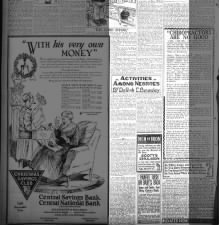Activities Among Negroes
By Delilah L. Beasley
The Art and Industrial Club held its annual bazaar and sale of art needlework last Thursday afternoon and evening in the community house in West Oakland. Mrs. Hutton of Stockton and Mrs. L. J. Williams of Vallejo, members of the club, came to attend the bazaar. A program was rendered in the evening.
The Phyllis Wheatley Club of Young Girls is preparing a program of Christmas music which they will render Sunday afternoon, December 23, at the Home for Aged and Infirm Colored People in Beula. Each member of the club I will carry a gift to the inmates of the home,
In a recent issue of the "Forward," a white weekly published in Philadelphia, there appeared the following under "The Church in Action:" "The Abyssinian church of New York City, the third oldest negro Baptist church in America, has dedicated a new church and community house which cost $350,000. They are considered the finest buildings of their kind owned by negroes."
The colored people of America are rejoicing over the recent decision of the Poetry Society of America. (white). which recently awarded the second Witter Byner prize to a member of their group. Every year this society conducts a poetry contest open to undergraduates of colleges and universities. This year there were sixty-three colleges and universities representing 700 undergraduates who entered the contest. C. P. Cullen, the successful colored contributor is 23 years old and a student in the junior class of the college of arts and pure science in the University of New York. His poem winning the prize contained 200 lines. It is called "The Ballad of the Brown Girl." [See also this.] Previous to entering the university he attended the DeWitt Clinton High School of New York City. He won every prize, including the Douglas Fairbanks, every year during his four years' attendance, A poem of his appeared in the Bookman for November entitled "To a Brown Boy."
The colored people are mourning the sudden death from heart trouble of Phillip Brown of Washington, D. C.. which occurred Thanksgiving evening in his home in that city. He was commissioner of conciliation and director of negro economics with the Department of Labor. He was born in Ironton, O., going to Washington at an early age, where he learned the printer's trade. Later he was employed for a number of years in the government printing office. He was the first colored man to be admitted to the printers' union. He was at one time junior editor of the New York World, and after leaving that paper became associate editor of "Judge.". Later he published a paper in Hopkinsville, Ky. He was recognized as Republican leader to the extent that he was selected as a delegate to the last national convention. He numbered among his friends the late President Harding. Senator Medill McCormick of Illinois and President Coolidge, who sent the following telegram to his widow:
"My Dear Mrs. Brown: The news of your husband's death has Just reached me and I am hastening to express my sympathy and most sincere condolence. I have had occasion to know something or his long, faithful and highly efficient services to the government, and wish you to know of my conviction that the country and the public service have sustained a very real loss in his death."
In the New York "Age," under the head of "Comments of Other Editors," the following appeared as an extract from the Savannah Tribune (white) in which it quoted the president of the Federated Women's Clubs of Tennessee (white) as saying: "Recently the proposal that a monument be erected to the black mammy in Washington, D. C.. met with a loud protest in that city. In a way I am glad that it did, for that monument was to be but a thing of bronze and marble, and we women of the South cherish the memories of our black mammies in too warm a way to commemorate them in such a cold fashion. What I propose is a home to be erected in the largest cities in each of the ten Congressional districts of Tennessee. Some homes will not be large, a frame dwelling of half a dozen rooms, a garden with trees, property which need not exceed $5000 in cost with an allotment of $50 to $100 a month to pay for fuel and wood, the whole to represent an endowment of from $1500 to $2000. Inasmuch as such homes would be of civic benefit to the district in which they were located, I propose that they be purchased and endowed by municipal governments. I believe that 50 per cent of such expenses should be borne by the city or town in which they are located and the other 50 per cent by the combined counties of the district. The proposition was unanimously endorsed by the members of the board and plans adopted to put it into effect."




